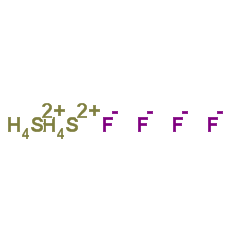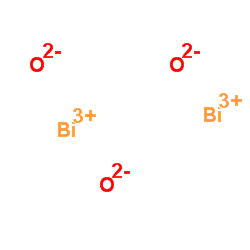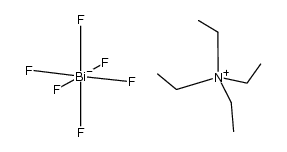7787-61-3
| 中文名 | 氟化铋(III) |
|---|---|
| 英文名 | Bismuth(III) Fluoride |
| 中文别名 | 三氟化铋 |
| 英文别名 |
EINECS 232-124-8
trifluorobismuthane MFCD00010893 |
| 密度 | 8.3 |
|---|---|
| 沸点 | 900℃ |
| 熔点 | 727ºC |
| 分子式 | BiF3 |
| 分子量 | 265.97600 |
| 精确质量 | 265.97600 |
| LogP | 1.26060 |
| 外观性状 | 白色晶体或结晶粉末 |
| 折射率 | 1.74 |
| 储存条件 | 本品应密封保存。 |
| 稳定性 | 有α型和β型两种,用上述方法制得者为α型,如果将α型加热至220℃,就可转变为β型。熔点为725~730℃。如果加热至900℃,就有相当程度的蒸发。难溶于水及氟化氢水溶液。利用氢氧化铋与过量的氟化氢反应,可制得吸湿性强的酸式盐BiF3·2HF。酸式盐水解即可变为BiOF·2HF,如果进一步加热,即变为BiF3及BiOF。 |
| 计算化学 | 1.疏水参数计算参考值(XlogP):无 2.氢键供体数量:0 3.氢键受体数量:3 4.可旋转化学键数量:0 5.互变异构体数量:无 6.拓扑分子极性表面积0 7.重原子数量:4 8.表面电荷:0 9.复杂度:8 10.同位素原子数量:0 11.确定原子立构中心数量:0 12.不确定原子立构中心数量:0 13.确定化学键立构中心数量:0 14.不确定化学键立构中心数量:0 15.共价键单元数量:1 |
| 更多 | 1. 性状:白色结晶。较高温度下逐渐挥发,但不分解。 2. 密度(g/mL,25/4℃): 8.3 3. 相对蒸汽密度(g/mL,空气=1):未确定 4. 熔点(ºC): 725~730 5. 沸点(ºC,常压):未确定 6. 沸点(ºC,5.2kPa):未确定 7. 折射率: 1.74 8. 闪点(ºC):未确定 9. 比旋光度(º):未确定 10. 自燃点或引燃温度(ºC):未确定 11. 蒸气压(kPa,25ºC):未确定 12. 饱和蒸气压(kPa,60ºC):未确定 13. 燃烧热(KJ/mol):未确定 14. 临界温度(ºC):未确定 15. 临界压力(KPa):未确定 16. 油水(辛醇/水)分配系数的对数值:未确定 17. 爆炸上限(%,V/V):未确定 18. 爆炸下限(%,V/V):未确定 19. 溶解性:溶于氢氟酸形成络合物,溶于无机酸,几乎不溶于水。 |
Synonym: Section 2 - COMPOSITION, INFORMATION ON INGREDIENTS
Risk Phrases: None Listed. Section 3 - HAZARDS IDENTIFICATION EMERGENCY OVERVIEW
The toxicological properties of this material have not been fully investigated. Potential Health Effects Eye: No information regarding eye irritation and other potential effects was found. Skin: No information regarding skin irritation and other potential effects was found. Ingestion: The toxicological properties of this substance have not been fully investigated. Inorganic fluorides can be harmful. Acute exposure to fluorine compounds can lead to digestive tract burns, and abdominal pain. May cause fever and rheumatic pain. Inhalation: The toxicological properties of this substance have not been fully investigated. Chronic: Chronic inhalation and ingestion may cause chronic fluoride poisoning (fluorosis) characterized by weight loss, weakness, anemia, brittle bones, and stiff joints. Repeated or prolonged exposure may cause a bismuth line or black spots on the gums, foul breath and salivation. Chronic exposure to fluoride compounds may cause systemic toxicity. Section 4 - FIRST AID MEASURES Eyes: Flush eyes with plenty of water for at least 15 minutes, occasionally lifting the upper and lower eyelids. Get medical aid immediately. Skin: Get medical aid. Flush skin with plenty of water for at least 15 minutes while removing contaminated clothing and shoes. Ingestion: If victim is conscious and alert, give 2-4 cupfuls of milk or water. Never give anything by mouth to an unconscious person. Get medical aid immediately. Inhalation: Get medical aid immediately. Remove from exposure and move to fresh air immediately. If breathing is difficult, give oxygen. Notes to Physician: Section 5 - FIRE FIGHTING MEASURES General Information: Not available. Extinguishing Media: Not available. Section 6 - ACCIDENTAL RELEASE MEASURES General Information: Use proper personal protective equipment as indicated in Section 8. Spills/Leaks: Sweep up or absorb material, then place into a suitable clean, dry, closed container for disposal. Section 7 - HANDLING and STORAGE Handling: Wash thoroughly after handling. Use only in a well-ventilated area. Avoid contact with eyes, skin, and clothing. Avoid ingestion and inhalation. Storage: Store in a cool, dry place. Store in a tightly closed container. Section 8 - EXPOSURE CONTROLS, PERSONAL PROTECTION Engineering Controls: Use adequate ventilation to keep airborne concentrations low. Exposure Limits CAS# 7787-61-3: Personal Protective Equipment Eyes: Wear appropriate protective eyeglasses or chemical safety goggles as described by OSHA's eye and face protection regulations in 29 CFR 1910.133 or European Standard EN166. Skin: Wear appropriate protective gloves to prevent skin exposure. Clothing: Wear appropriate protective clothing to prevent skin exposure. Respirators: Follow the OSHA respirator regulations found in 29 CFR 1910.134 or European Standard EN 149. Use a NIOSH/MSHA or European Standard EN 149 approved respirator if exposure limits are exceeded or if irritation or other symptoms are experienced. Section 9 - PHYSICAL AND CHEMICAL PROPERTIES Physical State: Crystals Color: white to gray Odor: Not available. pH: Not available. Vapor Pressure: Not available. Viscosity: Not available. Boiling Point: Not available. Freezing/Melting Point: Not available. Autoignition Temperature: Not available. Flash Point: Not available. Explosion Limits, lower: Not available. Explosion Limits, upper: Not available. Decomposition Temperature: Solubility in water: Practically insoluable Specific Gravity/Density: Molecular Formula: BiF3 Molecular Weight: 265.9792 Section 10 - STABILITY AND REACTIVITY Chemical Stability: Stable under normal temperatures and pressures. Conditions to Avoid: Moisture, excess heat. Incompatibilities with Other Materials: Strong oxidizing agents, strong acids. Hazardous Decomposition Products: Hydrogen fluoride gas. Hazardous Polymerization: Has not been reported Section 11 - TOXICOLOGICAL INFORMATION RTECS#: CAS# 7787-61-3 unlisted. LD50/LC50: Not available. Carcinogenicity: Bismuth (III) Fluoride - Not listed by ACGIH, IARC, or NTP. Section 12 - ECOLOGICAL INFORMATION Section 13 - DISPOSAL CONSIDERATIONS Dispose of in a manner consistent with federal, state, and local regulations. Section 14 - TRANSPORT INFORMATION IATA Not regulated as a hazardous material. IMO Not regulated as a hazardous material. RID/ADR Not regulated as a hazardous material. Section 15 - REGULATORY INFORMATION European/International Regulations European Labeling in Accordance with EC Directives Hazard Symbols: Not available. Risk Phrases: Safety Phrases: WGK (Water Danger/Protection) CAS# 7787-61-3: No information available. Canada CAS# 7787-61-3 is listed on Canada's NDSL List. CAS# 7787-61-3 is not listed on Canada's Ingredient Disclosure List. US FEDERAL TSCA CAS# 7787-61-3 is listed on the TSCA inventory. SECTION 16 - ADDITIONAL INFORMATION N/A |
|
毒理学数据: 急性毒性: 主要的刺激性影响: 在皮肤上面:刺激皮肤和黏膜。 在眼睛上面:刺激的影响。 致敏作用:没有已知的敏化作用。 生态学数据: 总括注解 通常来说对水是不危害的 若无政府许可,勿将材料排入周围环境。
|
| 符号 |

GHS05 |
|---|---|
| 信号词 | Danger |
| 危害声明 | H314 |
| 警示性声明 | P260-P280-P303 + P361 + P353-P304 + P340 + P310-P305 + P351 + P338 |
| 个人防护装备 | Eyeshields;Faceshields;full-face particle respirator type N100 (US);Gloves;respirator cartridge type N100 (US);type P1 (EN143) respirator filter;type P3 (EN 143) respirator cartridges |
| 危害码 (欧洲) | C |
| 风险声明 (欧洲) | 34 |
| 安全声明 (欧洲) | 26-36/37/39-45 |
| 危险品运输编码 | UN 3260 8/PG 2 |
| WGK德国 | 3 |
| 包装等级 | III |
| 上游产品 10 | |
|---|---|
| 下游产品 4 | |









![11-cyclohexyl-5-(((perfluorooctyl)sulfonyl)oxy)-5,10,11,12-tetrahydro-5l5-benzo[c]benzo[3,4][1,2]azabismolo[1,2-a][1,2]azabismol-11-ium结构式](https://image.chemsrc.com/caspic/492/1186323-72-7.png)


